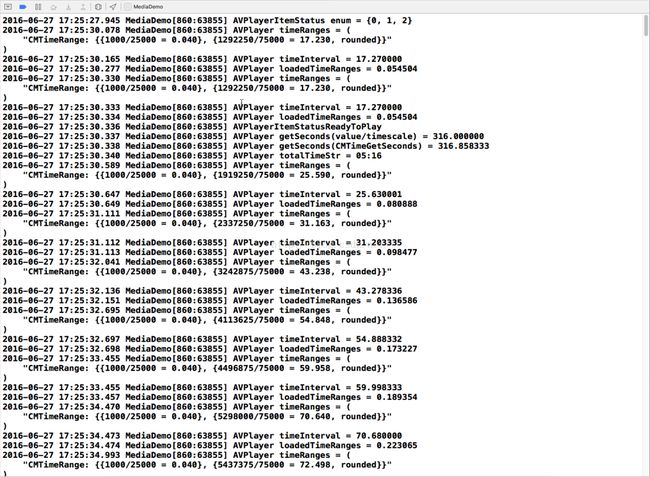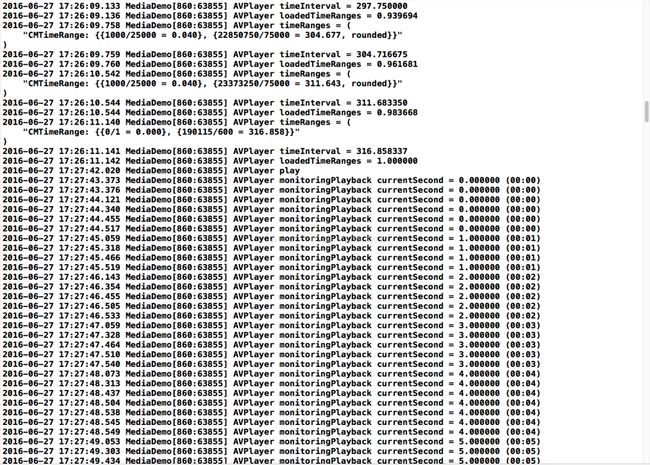iOS 多媒体编程(二)——视频(AVPlayer)
和音频播放一样,ios也提供个很多的API。如mediaPlayer.framework下的MPMediaPlayerController、AVFounditon.framework下的AVPlayer和AVKit下的AVPlayerViewcontroller。MPMovieplayerController已经在ios9.0中被废弃了,用来替代的是AVPlayerViewcontroller。
所以下面我主要介绍一下AVPlayer。
AVPlayer既可以播放音乐又可以播放视频;使用AVPlayer不能直接显示视频,必须要加入AVPlayerLayer中,并添加到其他能显示的layer中。
AVPlayer和AVAudioPlayer,如果要使用的话,需要添加 AVFoundation.framework 和其头文件 #import
主要代码如下(接上一篇文章)
/*
iOS9默认禁用http协议,改为https协议,如果继续使用http则会报错
App Transport Security has blocked a cleartext HTTP (http://) resource load since it is insecure. Temporary exceptions can be configured via your app's Info.plist file.
因此需要修改info.plist文件,添加如下
NSAppTransportSecurity
NSAllowsArbitraryLoads
*/
-(void)addAVPlayerLayer {
//NSString *path = [[NSBundle mainBundle] pathForResource:@"183" ofType:@"wav"];
//NSURL *url = [NSURL fileURLWithPath:path];
//NSURL *url = [NSURL URLWithString:@"http://v.jxvdy.com/sendfile/w5bgP3A8JgiQQo5l0hvoNGE2H16WbN09X-ONHPq3P3C1BISgf7C-qVs6_c8oaw3zKScO78I--b0BGFBRxlpw13sf2e54QA"];
NSURL *url = [NSURL URLWithString:@"http://static.tripbe.com/videofiles/20121214/9533522808.f4v.mp4"];
//'MPMoviePlayerController' is deprecated: first deprecated in iOS 9.0 - Use AVPlayerViewController in AVKit
//[self.view addSubview:[MPMoviePlayerController new].view];
self.avPlayerItem = [AVPlayerItem playerItemWithURL:url];
self.avPlayer = [AVPlayer playerWithPlayerItem:self.avPlayerItem];
AVPlayerLayer *avPlayerLayer = [AVPlayerLayer playerLayerWithPlayer:self.avPlayer];
CGRect screenRect = [UIScreen mainScreen].bounds;
avPlayerLayer.frame = CGRectMake(0, screenRect.size.height/2, screenRect.size.width, screenRect.size.height/2);
/*
AVF_EXPORT NSString *const AVLayerVideoGravityResizeAspect NS_AVAILABLE(10_7, 4_0);
AVF_EXPORT NSString *const AVLayerVideoGravityResizeAspectFill NS_AVAILABLE(10_7, 4_0);
AVF_EXPORT NSString *const AVLayerVideoGravityResize NS_AVAILABLE(10_7, 4_0);
*/
avPlayerLayer.videoGravity = AVLayerVideoGravityResizeAspect;
avPlayerLayer.repeatCount = 1;
//avPlayerLayer.backgroundColor = [UIColor blueColor].CGColor;
[self.view.layer addSublayer:avPlayerLayer];
//调用
[[NSNotificationCenter defaultCenter] addObserver:self selector:@selector(avPlayerDidEnd) name:AVPlayerItemDidPlayToEndTimeNotification object:self.avPlayerItem];
/*
status共有三种属性
(1)AVPlayerStatusUnknown,
(2)AVPlayerStatusReadyToPlay,
(3)AVPlayerStatusFailed
*/
[self.avPlayerItem addObserver:self forKeyPath:@"status" options:NSKeyValueObservingOptionNew context:nil];
//loadedTimeRanges 表示已经缓冲的进度,监听此属性可以在UI中更新缓冲进度
[self.avPlayerItem addObserver:self forKeyPath:@"loadedTimeRanges" options:NSKeyValueObservingOptionNew context:nil];
NSLog(@"AVPlayerItemStatus enum = {%ld, %ld, %ld}", AVPlayerItemStatusUnknown, AVPlayerStatusReadyToPlay, AVPlayerItemStatusFailed);
}
-(void)playAVPlayer {
NSLog(@"AVPlayer play");
[self.avPlayerItem seekToTime:kCMTimeZero];
[self.avPlayer play];
}
-(void)avPlayerDidEnd {
NSLog(@"AVPlayer end");
}
//定义在@interface NSKeyValueObserving.h
//Given that the receiver has been registered as an observer of the value at a key path relative to an object, be notified of a change to that value.
-(void)observeValueForKeyPath:(NSString *)keyPath ofObject:(id)object change:(NSDictionary *)change context:(void *)context {
NSLog(@"observeValueForKeyPath");
AVPlayerItem *playerItem = (AVPlayerItem *)object;
if([keyPath isEqualToString:@"status"]) {
switch (playerItem.status) {
case AVPlayerItemStatusUnknown:
NSLog(@"AVPlayerItemStatusUnknown");
break;
case AVPlayerItemStatusReadyToPlay:
{
NSLog(@"AVPlayerItemStatusReadyToPlay");
CMTime duration = playerItem.duration;
//转换为时间戳(1970到现在的秒数),timescale是 时间表[尺度],时标,时间量程(value/timescale = seconds)
CGFloat totalSecond = duration.value / duration.timescale;
CGFloat totalSecond2 = CMTimeGetSeconds(duration);
NSLog(@"AVPlayer getSeconds(value/timescale) = %f", totalSecond);
NSLog(@"AVPlayer getSeconds(CMTimeGetSeconds) = %f", totalSecond2);
NSString *totalTimeStr = [self convertTime:totalSecond];
NSLog(@"AVPlayer totalTimeStr = %@", totalTimeStr);
//监听播放状态
[self monitoringPlayback:playerItem];
}
break;
case AVPlayerItemStatusFailed:
NSLog(@"AVPlayerItemStatusFailed");
break;
default:
break;
}
} else if([keyPath isEqualToString:@"loadedTimeRanges"]) {
//计算缓冲进度
NSTimeInterval timeInterval = [self aVPlayerLoadedEndTime];
NSLog(@"AVPlayer timeInterval = %f", timeInterval);
CMTime duration = playerItem.duration;
CGFloat totalDuration = CMTimeGetSeconds(duration);
CGFloat progress = timeInterval / totalDuration;
NSLog(@"AVPlayer loadedTimeRanges = %f", progress);
}
}
-(NSString *)convertTime:(CGFloat)second {
//second为1970年到现在的TimeInterval(秒数)
NSDate *date = [NSDate dateWithTimeIntervalSince1970:second];
NSDateFormatter *formatter = [[NSDateFormatter alloc] init];
if(second / 3600 >= 1) {
[formatter setDateFormat:@"HH:mm:ss"];
} else {
[formatter setDateFormat:@"mm:ss"];
}
NSString *timeStr = [formatter stringFromDate:date];
return timeStr;
}
-(void)monitoringPlayback:(AVPlayerItem *)playerItem {
__block ViewController *myClass = self;
//CMTimeMake(a,b) a当前第几帧,b每秒多少帧。当前播放时间为a/b
//CMTimeMakeWithSeconds a当前时间,b每秒多少帧。当前的帧序号为a*b
//Periodic是周期性, 队列传NULL代表在主线程中执行
[self.avPlayer addPeriodicTimeObserverForInterval:CMTimeMake(1, 1) queue:NULL usingBlock:^(CMTime time) {
//计算当前在第几秒
CGFloat currentSecond = self.avPlayerItem.currentTime.value/self.avPlayerItem.currentTime.timescale;
//Capturing 'self' strongly in this block is likely to lead to a retain cycle
NSString *currentTimeStr = [myClass convertTime:currentSecond];
NSLog(@"AVPlayer monitoringPlayback currentSecond = %f (%@)", currentSecond, currentTimeStr);
}];
}
//获取当前缓冲的进度,换算成与1970年相差的秒数
-(NSTimeInterval)aVPlayerLoadedEndTime {
//NSValue对象是用来存储一个C或Objective-C数据的简单容器。它可以保存任意类型的数据(既包括基本类型,也包括point、struct、id)
//NSValue类的目标就是允许以上数据类型的数据结构能够被添加到集合里。
NSArray *loadedTimeRanges = self.avPlayer.currentItem.loadedTimeRanges;
NSLog(@"AVPlayer timeRanges = %@", loadedTimeRanges);
/*
获取缓冲区域
typedef struct
{
CMTime start; //@field start The start time of the time range.
CMTime duration; // @field duration The duration of the time range.
} CMTimeRange;
*/
CMTimeRange timeRange = [loadedTimeRanges.firstObject CMTimeRangeValue];
//Converts a CMTime to seconds.
float startSeconds = CMTimeGetSeconds(timeRange.start);
float durationSeconds = CMTimeGetSeconds(timeRange.duration);
NSTimeInterval endSeconds = startSeconds + durationSeconds;
return endSeconds;
} 运行打印截图
打开程序,但还未按下播放按钮时,会显示第一帧。
(此处略去一些打印内容。。。。。。)
可以看到如果不等其全部缓冲好,就按下 “播放”按钮其也可以正常播放,这就说明AVPlayer是一个网络播放器(即AVPlayer支持变下边播的流媒体播放器)
左图为等其全部加载好再按下"播放"按钮;右图为还未全部缓冲完就点击"播放"按钮
(此处略去一些打印内容。。。。。。)
周期性的打印每帧的信息。
播放完毕后会停在最后一帧


